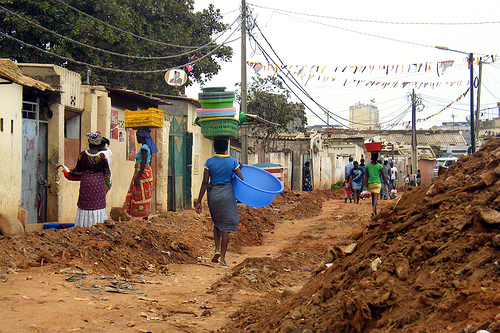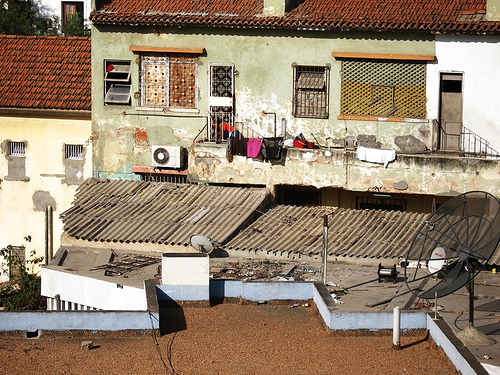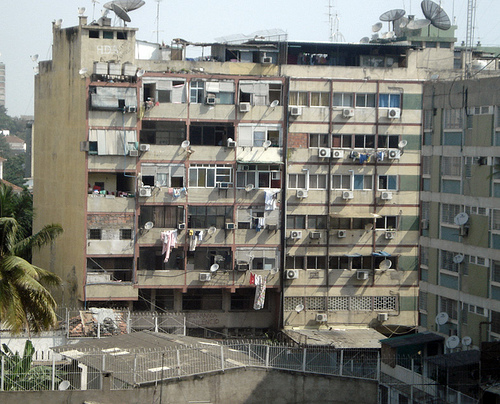Property and land speculation in Angola has reached an alarmingly high level, accounting for construction materials’ importation, customs fees, lack of legislation, high demand and low supply, and perhaps even developers’ bad faith.
A quick look around shows a significant number of luxury estates, properly furnished flats in glass buildings with access to garages, gyms and swimming pools that seem to have come from a magic wand. And despite the ridiculously high prices – around a million dollars and sometimes over – developers know well in advance, even before the inauguration of the buildings, that there will be many buyers.
It is obvious those who buy in these developments are upper class individuals; people connected to power or foreign companies which buy and then set up guest houses for their employees. It is also obvious that the low and middle classes find themselves excluded from the possibility of acquiring housing like these.
“Luanda Buildings”, photo by Flickr's user wilsonbentos published under a Creative Commons license
The big issue in all this is the fact that there are no places that meet the financial possibilities of most of the population. And the few existing ones leave much to be desired because of the poor quality of construction materials. Cazimar, from the Africa Minha [pt] blog, illustrates this situation well :
“Começa-se a levantar o véu sobre a polémica da especulação imobiliária em Angola e os seus respectivos destinatários interessados neste negócio, quer sejam vendedores, compradores, investidores ou banca e etc. Este tipo de negócio interessará a quem? Certamente que não interessará à maioria do cidadão angolano de baixos rendimentos, porque esses pobres coitados por enquanto só podem sonhar com uma habitação made in China de duvidosa qualidade (marketing eleitoral) ou com a compra ou aluguer de uma cubata num dos musseques (bairro de lata ou favela) mais luxuosos e povoados, situados privilegiadamente ao redor e na parte central da cidade de Luanda. No entanto a localização destes musseques também começa a sofrer a cobiça pelos terrenos por parte dos grandes grupos imobiliários, alguns deles apoiados por pessoal com forte influência junto do poder central e das decisões. Refiro-me aos generais, ministros e respectivos familiares. A maioria dos familiares desta corja sugadora, são os principais responsáveis ou accionistas das empresas envolvidas em grandes projectos de construção imobiliária. Cabendo aos generais e aos outros membros o papel de exercerem influências internamente nos organismos a quem cabe a responsabilidade de supervisionar e administrar esses terrenos e locais. Na maioria das vezes, o cidadão comum (pobre) que vive nesses terrenos é expropriado sem direito a contrapartidas, sendo posteriormente os terrenos vendidos a preços exorbitantes aos interessados na sua compra, com avultadas comissões (gasosa = suborno) aos intervenientes que facilitaram o seu desbloqueamento e expropriação.
Eles (corja) estão sempre a “mamar e a sacar” dependendo dos objectivos de cada um. Tudo isto é facilitado pela falta de legislação adequada e que tarda em aparecer por impedimento da corja envolvida na corrupção do negócio imobiliário de luxo para Angola e para a cidade de Luanda”.
“The veil drawn over the controversy of property speculation in Angola and the respective parties interested in this business, such as sellers, buyers, investors or banks, starts to come off. Who is interested in this type of business? Certainly, it is not the interest of the majority of the Angolan citizens with low income, because for now these poor things can only dream of a dwelling made in China of dubious quality (electoral marketing) or of the purchase or rental of a hut in more luxurious musseques (shantytowns) and villages, located mainly around and in the center of Luanda city. However, because of their location, these musseques also begin to suffer from the greed for land of large property groups, some supported by staff who have a strong influence on central power and decisions. I refer to the generals, ministers and their families. Most of this suckling rabble's families are primarily responsible for, or are shareholders of, companies involved in major construction developments. The generals and the other family members have the role of exercising inside influence on the bodies responsible for supervising and administering land and spaces. In most cases, ordinary people (the poor) living on such land are expropriated without the right to return, after which the land is sold at exorbitant prices to those interested in its purchase, with large commissions (bribery) for the actors that facilitated its release and expropriation.
They (the rabble) are always ‘suckling and withdrawing’ depending on their own objectives. All this is facilitated by a lack of appropriate legislation which is slow to appear due to obstacles imposed by the rabble involved in the business of building luxury for Angola and for the city of Luanda”
“Luanda is like this”, photo by Moisés Nazário, Flickr user Moises.on published under a Creative Commons license
Yet it seems that things have started to change now that the Government intends to implement, in the short term, measures to combat property speculation with a special emphasis on Luanda. It should be noted that other provinces in the country have not suffered from this speculation. In an interview with Jornal de Angola, the Deputy Minister of Urban Planning and Environment said that “the level of speculation in real estate prices in Luanda is very worrying and makes the lives of poor citizens even harder. The fight is through legal mechanisms that protect citizens from the speculation that takes place in the housing market in the capital and also in a program for encouraging housing so that all citizens have access to appropriate housing at lower prices.”
Gil Gonçalves, from the Universal blog [pt], summarizes the situation in which most Angolans live in the face of property speculation.
“Os especuladores imobiliários por onde passam, corrompem governos, titanicam nações. Conseguem corromper um centímetro de terra e lá construírem um minimercado. Se não acabarmos com os especuladores imobiliários, eles acabarão connosco”.
“Wherever they go, the real estate speculators corrupt governments, bully nations. They manage to corrupt one centimeter of land and then build a corner shop. If we don't finish off the real estate speculators, they will finish us off.”
Another major problem experienced by Angolans is the rent market. Each landlord uses a price table of his own prices and their imagination knows no bounds. Prices vary between two thousand and ten thousand dollars and these values do not always match the quality of the house. Most of the time there are houses with only one bedroom with no hydraulic pump or power generator. And in the vast majority of cases, landlords sign a contract with tenants and they are the first not comply, apart from requiring six months or one year's rent in advance.

“Angola2″, photo by Flickr's user kaysha published under a Creative Commons license
It is high time we had a law that forced landlords to respect drawn-up contracts and established price lists among others. It is also necessary that the Consumer Association is heard and acts accordingly. While this doesn't happen, Angolans are left subject to this implacable reality. Angola For my Family and my Friends blog [pt] certifies this:
“O aluguer das casas é muito elevado e ainda são infra-estruturas de pouca oferta. Das duas uma, ou o pacote de trabalho (para estrangeiros) inclui casa ou o teu rendimento tem de sustentar essa condição. As rendas podem ir de 2000/3000 dólares até onde o pensamento te deixar ir. A mais cara que vi, pediam 15.000 dólares por mês, mas sabe-se de condomínios que chegam a pedir 25.000. Tendo sempre em conta a particularidade comum em pagar sempre os primeiros seis meses ou o primeiro ano de arrendamento na sua totalidade.”
The rent prices are very high and there is little offer of a sound infrastructure. It is either the work package (for foreigners) including home or your income has to be enough to pay for it. Rents can go from [US]$2,000/3,000 to wherever your imagination takes you to. In the most expensive I saw, they were asking [US]$15,000 a month, but it is known there are estates for which they ask [US]$25,000. Bearing in mind the particularity common practice of having to pay the first six months or the first year of rent in full.

“Balance”, photo of Mártires do Kifangondo neighborhood of Luanda by Flickr's user elisa vaz published in this piece with the photographer's permission
There are two very interesting videos on the subject on YouTube. The first one, by user Diogobezerra6, is a collage of pictures of new buildings and developments called The New Luanda. The second is a video response to this, a videoclip for the song “Monangambê” by “Luanda Dread Band”, with footage from user INESAAODH‘s rides through another side of the city.
Originally written in Portuguese, translation into English by Paula Góes









22 comments
Uauuu! Nao esperava tanta agitacao por tao pouco! Nem pessoas tao importantes e tao ocupadas como os editores aqui a comentar e a traduzir…
Uma vez que a Clara disse que ja tem quem lhe traduza os textos pensamos que ja nao valia a pena contacta-la por email. Mas gostariamos de saber um pouco mais sobre ela e onde trabalha porque os jornalistas sao pessoas publicas, nao eh verdade?
Visto que agradecem contribuicoes aqui vai uma: porque que nao fazem anuncios publicos de vagas para tradutores de varios paises africanos, por uma questao de transparencia?
E quanto ao meu email, talvez tenha sido um erro tecnico, mas ele esta correcto. E pensei que o email dos comentadores nunca eram publicados… Mas se precisarem mesmo de me voltar a contactar, preferia que fosse a Clara a faze-lo uma vez que foi a ela que me dirigi.
Obrigados por TANTA atencao!
Hi Daniel,
i couldn´t agree more with your words. Maybe onde day everything will change..i know i would like that.
Thank you!
Please see:
http://pt.globalvoicesonline.org/2008/09/03/em-que-canto-do-mundo-os-tradutores-do-lingua-moram/
Querida Paula,
terei todo o gosto em responder às tuas questões, através do e-mail.
Querida Clara,
O que me levou a comentar aqui foi o interesse do meu amigo ajuda-la com as traducoes. Voce disse que nao precisava. Mas tambem gostariamos de saber onde trabalha em Angola e temos a certeza que nao somos os unicos leitores do GVO que gostariam de saber isso. Hoje no mundo cada vez mais se exige transparencia em tudo e um orgao como o GVO nao pode escapar a isso. Se exigimos transparencia aos nossos governantes tambem temos que a exigir dos nossos jornalistas, especialmente aqueles que pretendem falar em nosso nome no mundo global. Nos tambem temos vozes e queremos que elas sejam ouvidas atraves de pessoas que nao tenham nada a esconder. Se as nossas perguntas so podem ser respondidas atraves do email, entao para que serve este espaco?
Parabens pelo teu bom trabalho miga
Infelizmente a corrupcao existe em todo o mundo, mas nota-se mais em Africa. Rico ficando mais rico e o pobre ficando se afundando mais.
Sera qe algum dia isso muda? Nao sei nao……. Tenho as minhas duvidas…….
Beijos e abracos xx
But Angela can write in English! Why on earth does she need a translator for?
Sorry, I meant Clara can write in English…